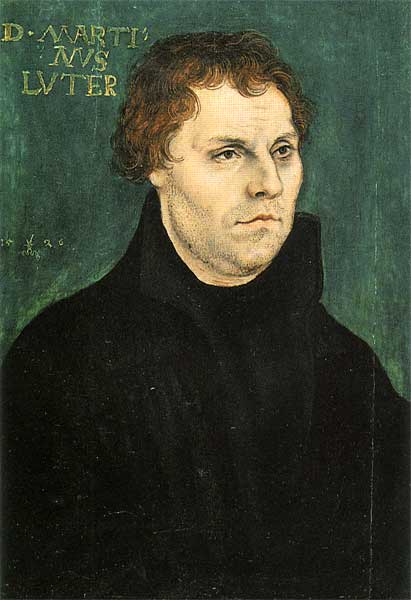Martin Luther, 31 December 1525 (age 42), by Lucas Cranach the Elder [public domain / Wikimedia Commons]
[all the words below are Martin Luther’s own; from my book, The “Catholic” Luther : An Ecumenical Collection of His “Traditional” Utterances]
* * * * *
[A] man is free to adore or invoke Christ in the sacrament, and he who does not adore Him commits no sin, neither does he commit sin who adores Him. . . . Where faith and love are present there can be no sin either in adoring or in not adoring Christ in the sacrament; . . . For faith adores Christ, because it sets before it only Him whose body and blood it doubts not to be present. . . . For no one denies—not even the Brethren, I take it— that the body and blood of Christ, who is the object of adoration, are present, . . .
(Letter to Paul Speratus, 13 June 1522; in Luther’s Correspondence and Other Contemporary Letters, Vol. II: 1521-1530; translated and edited by Preserved Smith and Charles M. Jacobs; Philadelphia: The Lutheran Publication Society: 1918)
[I]t is stated [in a Waldensian catechism] that in the sacrament Christ is not present substantially and naturally, and that he is not there to be adored. This is a matter of real concern to us Germans.
(The Adoration of the Sacrament, 1523, tr. Abdel Ross Wentz; in Luther’s Works, American edition, edited by Jaroslav Pelikan [volumes 1-30] and Helmut T. Lehmann [volumes 31-55], St. Louis: Concordia Publishing House [volumes 1-30]; Philadelphia: Fortress Press [volumes 31-55], starting in 1955. This quotation was in vol. 36)
Now to come back to the sacrament: he who does not believe that Christ’s body and blood are present does well not to worship either with his spirit or with his body. But he who does believe, as sufficient demonstration has shown it ought to be believed, can surely not withhold his adoration of the body and blood of Christ without sinning. For I must always confess that Christ is present when his body and blood are present. His words do not lie to me, and he is not separated from his body and blood. (Ibid.)
[One should not withhold from him such worship and adoration either . . . one should not condemn and accuse of heresy people who do adore the sacrament. For although Christ has not commanded it, neither has he forbidden it, but often accepted it. Free, free it must be, according as one is disposed in his heart and has opportunity. (Ibid.)
[I]f you first exercise faith rightly, at the most important point, namely, with respect to the words, then the adoration of the sacrament will afterwards follow beautifully in its own place; . . . (Ibid.)
For as the Sacrament is elevated in a material manner and yet Christ’s body and blood are not seen in it, so He is remembered and elevated by the word of the sermon and is confessed and adored in the reception of the Sacrament.
(The German Mass and Order of Service, 1526, tr. A. Steimle; in Works of Martin Luther, Volume VI; Philadelphia: Muhlenberg Press: 1932)
[T]hree years ago in a German book to the Waldensians on the adoration of the Sacrament, published with other writings on the Eucharist, I not only testified to my own opinion but even confuted these “significators,” . . .
(Letter to John Heerwagen, 13 Sep. 1526)














